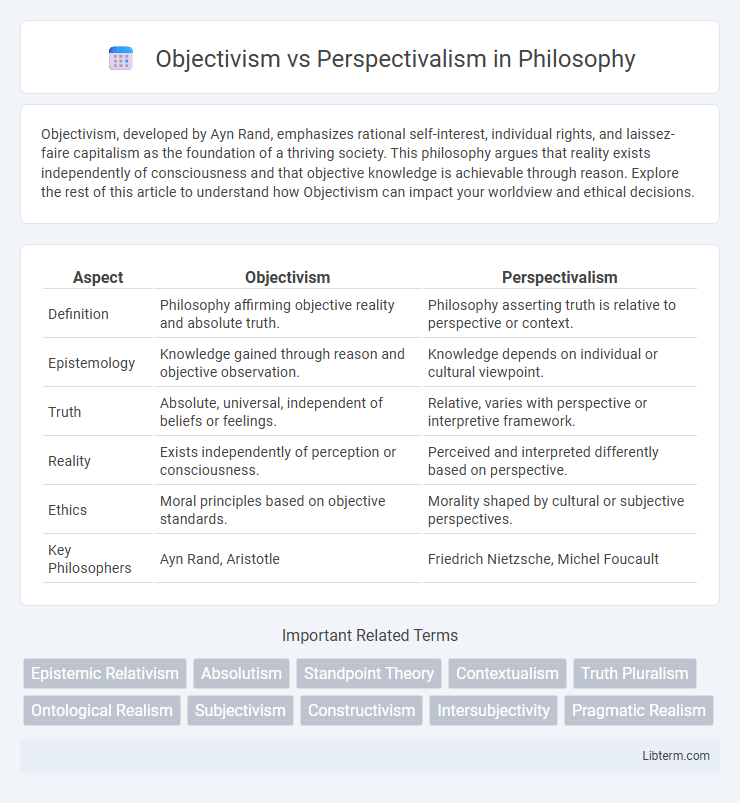Objectivism, developed by Ayn Rand, emphasizes rational self-interest, individual rights, and laissez-faire capitalism as the foundation of a thriving society. This philosophy argues that reality exists independently of consciousness and that objective knowledge is achievable through reason. Explore the rest of this article to understand how Objectivism can impact your worldview and ethical decisions.
Table of Comparison
| Aspect | Objectivism | Perspectivalism |
|---|---|---|
| Definition | Philosophy affirming objective reality and absolute truth. | Philosophy asserting truth is relative to perspective or context. |
| Epistemology | Knowledge gained through reason and objective observation. | Knowledge depends on individual or cultural viewpoint. |
| Truth | Absolute, universal, independent of beliefs or feelings. | Relative, varies with perspective or interpretive framework. |
| Reality | Exists independently of perception or consciousness. | Perceived and interpreted differently based on perspective. |
| Ethics | Moral principles based on objective standards. | Morality shaped by cultural or subjective perspectives. |
| Key Philosophers | Ayn Rand, Aristotle | Friedrich Nietzsche, Michel Foucault |
Defining Objectivism: Core Principles
Objectivism asserts the existence of objective reality independent of individual perceptions, emphasizing reason as the primary means to acquire knowledge. It champions individual rights, rational self-interest, and the pursuit of personal happiness as moral imperatives. This philosophy rejects relativism and subjectivism, promoting unwavering adherence to absolute facts and logical consistency.
Understanding Perspectivalism: An Overview
Perspectivalism asserts that all knowledge and truth are interpreted through individual or cultural perspectives, emphasizing the role of context, experience, and viewpoint in shaping understanding. Unlike Objectivism, which holds that reality and truth exist independently of perception, Perspectivalism highlights the multiplicity of valid interpretations influenced by subjective factors. This philosophical approach challenges the notion of absolute objectivity, promoting a more pluralistic and dynamic conception of truth grounded in human perspectives.
Historical Roots of Objectivism and Perspectivalism
Objectivism, rooted in Ayn Rand's philosophy from the mid-20th century, emphasizes objective reality and rational self-interest as fundamental principles. Perspectivalism traces back to Friedrich Nietzsche's 19th-century thought, asserting that knowledge and truth are always from particular perspectives influenced by individual experiences and interpretations. These historical foundations shape ongoing debates on the nature of truth, reality, and human understanding in contemporary philosophy.
Truth in Objectivism: Universal and Absolute?
Objectivism asserts that truth is universal and absolute, existing independently of individual beliefs or perspectives. It holds that facts and reality possess objective properties that can be discovered through reason and evidence, making truth invariant across contexts. This contrasts with perspectivalism, which views truth as relative to different viewpoints and inherently tied to subjective experiences.
Perspectivalism and the Nature of Subjective Truth
Perspectivalism emphasizes that truth is inherently linked to individual perspectives, asserting that subjective truth arises from unique contexts and interpretations rather than absolute facts. This philosophical view argues that knowledge and reality are understood through diverse viewpoints shaped by personal, cultural, and situational factors. By highlighting the variability of truth, perspectivalism challenges objectivism's claim of universal, immutable truths, framing truth as dynamic and dependent on subjective experience.
Epistemology: Knowledge Through Objective or Subjective Lenses
Objectivism asserts that knowledge is acquired through objective reality, emphasizing universal truths independent of individual perspectives, while perspectivalism argues that knowledge is inherently shaped by subjective viewpoints and contexts. In epistemology, objectivism relies on empirical evidence and rationality as the foundation for certain knowledge, whereas perspectivalism highlights the interpretive nature of experience and acknowledges the plurality of truths. This debate concerns whether knowledge is a fixed, external entity or a fluid construct influenced by cultural, historical, and personal factors.
Objectivism vs Perspectivalism in Science and Ethics
Objectivism in science asserts that knowledge and truth exist independently of individual beliefs, emphasizing universal laws and objective facts, while Perspectivalism proposes that scientific understanding is shaped by context, interpretations, and varying viewpoints. In ethics, Objectivism holds that moral values are absolute and discoverable through rational means, whereas Perspectivalism argues that ethical judgments are relative, influenced by cultural, social, and personal perspectives. These contrasting views influence debates on the nature of reality, the validity of scientific theories, and the foundation of moral principles, impacting disciplines from physics to moral philosophy.
Criticisms of Objectivism: Limits and Challenges
Objectivism faces criticism for its rigid emphasis on absolute truths, which some argue fails to account for the complexity and variability of human experiences across different contexts. Critics highlight that this strict adherence to objectivity may lead to the exclusion of subjective perspectives that provide valuable insights into individual and cultural diversity. The challenge lies in balancing universal principles with the nuanced understanding that perspectivalism offers, raising questions about the adequacy of objectivism in addressing moral and epistemological pluralism.
Debates Surrounding Perspectivalism: Strengths and Weaknesses
Debates surrounding perspectivalism highlight its strength in acknowledging the diversity of human experiences and the contextual nature of knowledge, which allows for a more flexible understanding of truth. Critics argue its primary weakness lies in potential relativism, risking the erosion of objective standards and making consensus difficult across differing perspectives. The tension between embracing multiple viewpoints and maintaining coherent, universal principles remains central to ongoing discussions in epistemology.
Contemporary Relevance: Navigating Between Objectivism and Perspectivalism
Contemporary debates in epistemology highlight the tension between Objectivism's commitment to universal truths and Perspectivalism's emphasis on context-dependent knowledge, influencing discussions in ethics, science, and politics. Objectivism provides a framework for consistent, objective standards, crucial in legal systems and scientific inquiry, while Perspectivalism accommodates cultural diversity and individual experiences, fostering inclusivity in social discourse. Navigating between these positions requires balancing the demand for objective criteria with the recognition of varying perspectives to address complex global challenges effectively.
Objectivism Infographic

 libterm.com
libterm.com